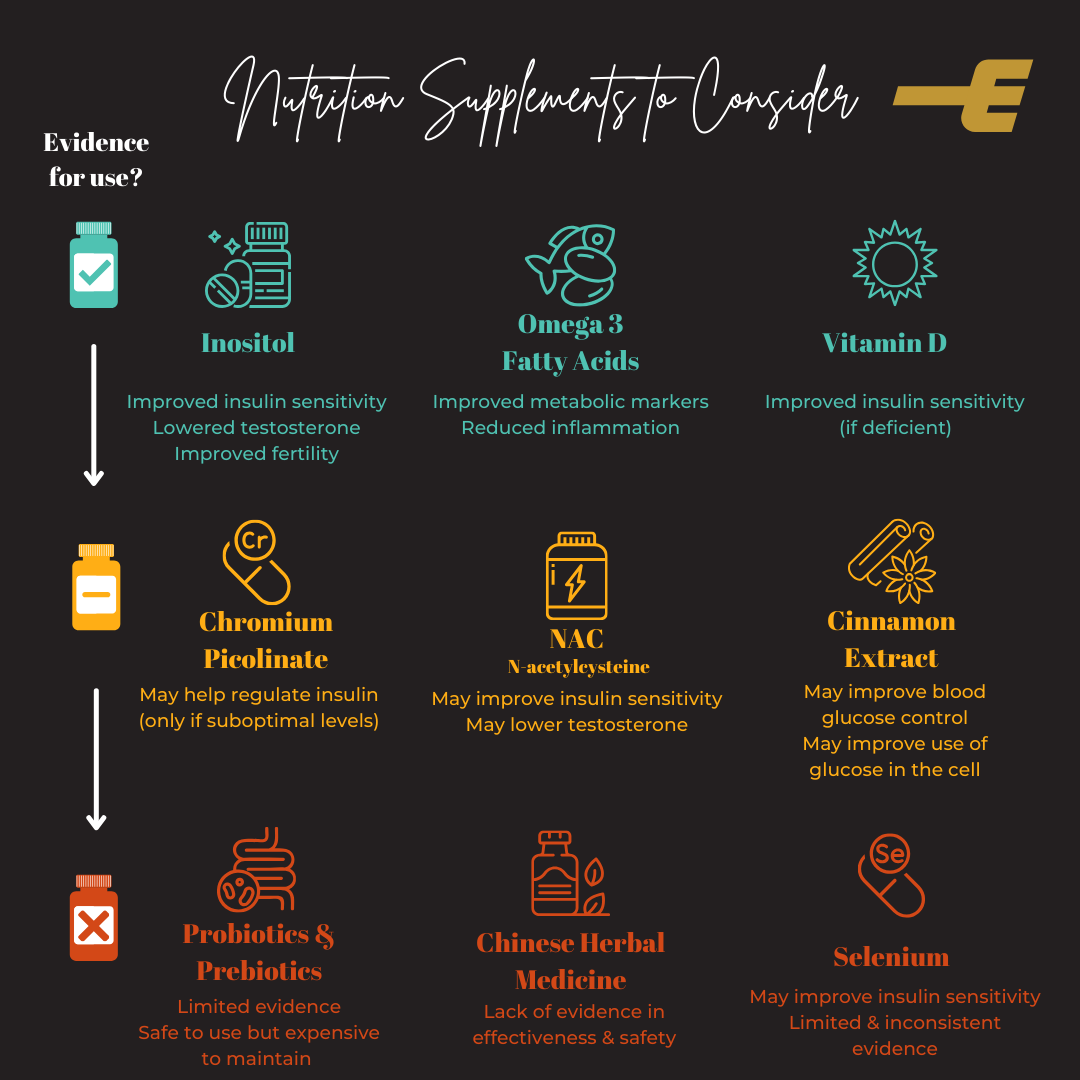
If you’ve been diagnosed with PCOS, it’s easy to turn to supplements, hoping they’ll help manage—or even fix—your symptoms. While they can offer support, they’re not a magic solution. The best results come from first building a solid foundation with nutrition and lifestyle changes. Once those are in place, the right supplements may provide that extra boost to help you feel and function at your best. Let’s explore which ones might be worth considering.
Please note that the following is simply information and not prescription. Any consideration of supplementation should be discussed with your medical professional and/or Dietitian prior.

Supplements You May Consider
Myo-Inositol
Inositol is a pseudovitamin i.e. not an essential vitamin but is similarly vital to the body. This supplement is known for assisting with fertility and improves insulin sensitivity. which is why it tends to show promise for PCOS and Type II Diabetes. It additionally can support improvements in anxiety and may help with depression.
In supporting the management of PCOS, the most common dosage with low risks associated, is 2-4g per day (please ensure it is Myo-Inositol). We usually recommend consuming this supp before breakfast each day.
Fish Oil
Fish Oil supplements include two types of Omega 3 Fatty Acids called EPA and DHA. These fatty acids are involved in regulating inflammation, your metabolic pathways and in brain function.
The positive effect of Fish Oil supplementation in PCOS is likely due to the improvement in metabolic markers. We’re talking about triglycerides, cholesterol and blood pressure. They may also support improved mental health, but more research is needed in this area.
These healthy fats are best gained from your diet (e.g. oily fish and seeds). But you can compliment your food intake by supplementing with 1000-3000mg daily.
Vitamin D
This is a supplement only to take if you have a deficiency.
Being low in Vitamin D may be linked to an increased risk of insulin resistance in PCOS. Studies have shown a link between low Vitamin D and higher levels of testosterone and insulin resistance. It is a bit of a chicken and egg situation, as we are quite sure which leads to what.
However, we do know that improving Vitamin D levels can improve symptoms of PCOS in women that have been diagnosed with a deficiency.
Chromium Picolinate
Chromium is an essential mineral that is found in plant products, mainly grains. Its function is to help regulate insulin in the body, so if chromium levels are low or suboptimal (true deficiencies are rare) this process can be impaired.
At the moment there is insufficient evidence to say that supplementation can help to manage or prevent insulin resistance or Type II Diabetes in women with PCOS. So at the moment, it is a watch this space and unlikely worth the investment – focus on getting those quality plant foods in instead.
N-acetyl-L-cysteine (NAC)
NAC is a form of the amino acid L-cysteine and a precurser to glutathione, an antioxidant. It provides a function in possibly improving insulin receptor function and insulin sensitivity in women with PCOS, along with reducing testosterone levels. However, a recent review (here) did show an improved pregnancy and ovulation rate in women who supplemented with NAC compared to placebo, but these weren’t superior to using Metformin. The review also showed no difference in acne, weight, testosterone or insulin levels with NAC.
With this, supplementation may be an option, however the risks need to be weighed up with any possible benefit – as the research findings so far are inconclusive.
Cinnamon
Cinnamon is a spice that you can find in any everyday supermarket. It can help slow the rate at which glucose enters the body and also improves the use of that glucose in the cell. In those finding spikes in blood glucose hard to manage, this may be something to consider adding to your food.
However, in large doses there is a compound in cinnamon that can have toxic effects called coumarin. So there is no need to go over doses of 1-2g per day. If you want to increase your intake of cinnamon, ceylon cinnamon is a better option. This is because it contains lower amounts of coumarin.
Who should be supplementing with cinnamon? Currently the evidence isn’t as strong as it should be for us to recommend it to everyone with PCOS. So it would mainly be for those needing help with blood glucose management. However, this shouldn’t stop you from adding it to your favourite meals and snacks!
Chinese Herbal Medicine
There is limited evidence that certain Chinese herbal medications may improve pregnancy outcomes and PCOS symptoms. However, there are few high-quality clinical studies being conducted in women with PCOS. So it’s a watch this space situation.
Currently, Chinese Herbal Medicine should not be recommended due to lack of evidence on effectiveness and safety related to pregnancy rate, ovulation rate and potential adverse effects.
Need More Support?
If you’re looking for a clearer path to managing PCOS through nutrition, we’d love to support you. Every journey with PCOS is unique, and we’re here to help you navigate symptoms like energy fluctuations, cravings, and hormonal changes with strategies tailored to your needs.
You don’t have to figure it out alone. Our app gives you unlimited access to your dietitian, offering ongoing support that evolves with you. With the right guidance, you’ll gain the confidence to make choices that support your long-term health and well-being.
Jump on a call with our team for more information, or complete your free Wellbeing Profile below!


